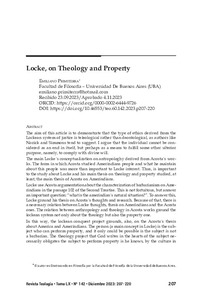Por favor, use este identificador para citar o enlazar este ítem:
https://repositorio.uca.edu.ar/handle/123456789/17626| Título: | Locke, on theology and property Acerca de la teología y la propiedad en Locke |
Autor: | Primiterra, Emiliano | Palabras clave: | Locke, John, 1632-1704; Acosta, José de, 1540-1600; PROPIEDAD; PUEBLOS ORIGINARIOS; ETICA; DEONTOLOGIA; CONQUISTA DE AMERICA | Fecha de publicación: | 2023 | Editorial: | Pontificia Universidad Católica Argentina. Facultad de Teología | Cita: | Primiterra, E. Locke, on theology and property [en línea]. Teología. 2023, 60 (142). doi: 10.46553/teo.60.142.2023.p207-220. Disponible en: https://repositorio.uca.edu.ar/handle/123456789/17626 | Resumen: | Abstract:
The aim of this article is to demonstrate that the type of ethics derived from the
Lockean system of justice is teleological rather than deontological, as authors like
Nozick and Simmons tend to suggest. I argue that the individual cannot be considered as an end in itself, but perhaps as a means to fulfill some other ulterior
purpose, namely, to comply with divine will.
The main Locke´s conceptualization on antropologhy derived from Acosta´s works. The form in which Acosta studied Amerindians people and what he maintain
about this people was more than important to Locke interest. Thus, is important
to the study about Locke and his main thesis on theology and property studied, at
least, the main thesis of Acosta on Amerindians.
Locke use Acosta argumentation about the characterization of barbarianism on Amerindians in the passage 102 of the Second Treatise. This is not fortuitous, but answer
an important question: “what is the amerindian´s natural situation?”. To answer this,
Locke ground his thesis on Acosta´s thoughts and research. Because of that, there is
a necessary relation between Locke thoughts, thesis on Amerindians and the Acosta
ones. The relation between anthropology and theology in Acosta works ground the
lockean system not only about the theology but also the property one.
In this way, the lockean conquest project grounds, also, on the Acosta´s thesis
about America and Amerindians. The person (a main concept in Locke) is the subject who can perform property, and it only could be possible is the subject is not
a barbarian. The theology project that God writes in the hearts of the subject necessarily obligates the subject to perform property is he knows, by the culture inwhich he sustains his own life, the proper ways in which he could perform it. In the
Amerindian ways of culture neither does not be possible that their people perform
property at all, nor be sovereigns. The Christian ones who lived in Europe does. Resumen: El objetivo de este artículo es demostrar que el tipo de ética derivada del sistema de justicia lockeano es más teleológico que deontológico, como tienden a sugerir autores como Nozick y Simmons. Sostengo que el individuo no puede considerarse como un fin en sí mismo, sino quizás como un medio para cumplir algún otro propósito ulterior, a saber, cumplir con la voluntad divina. La principal conceptualización de Locke sobre antropología derivó de los trabajos de Acosta. La forma en que Acosta estudió a los amerindios y lo que sostiene sobre este pueblo fue más que importante para el interés de Locke. Así, es importante el estudio sobre Locke y sus principales tesis sobre teología y propiedad estudiadas, al menos, las principales tesis de Acosta sobre los amerindios. Locke utiliza la argumentación de Acosta sobre la caracterización de la barbarie entre los amerindios en el pasaje 102 del Segundo Tratado. Esto no es fortuito, pero responde a una pregunta importante: “¿cuál es la situación natural de los amerindios?”. Para responder a esto, Locke basó su tesis en el pensamiento y la investigación de Acosta. Por eso, hay una relación necesaria entre los pensamientos de Locke, las tesis sobre los amerindios y las de Acosta. La relación entre antropología y teología en las obras de Acosta fundamenta el sistema lockeano no sólo en lo que respecta a la teología sino también a la propiedad. De esta manera, el proyecto lockeano de conquista se sustenta, también, en la tesis de Acosta sobre América y los amerindios. La persona (un concepto principal en Locke) es el sujeto que puede realizar una propiedad, y sólo podría ser posible si el sujeto no es un bárbaro. El proyecto de teología que Dios escribe en el corazón del sujeto obliga necesariamente al sujeto a realizar una propiedad si conoce, por la cultura en la que sostiene su propia vida, las formas adecuadas en que podría realizarla. En las formas de cultura amerindias no es posible que sus pueblos ejerzan propiedad alguna, ni sean soberanos. Los cristianos que vivieron en Europa sí. |
URI: | https://repositorio.uca.edu.ar/handle/123456789/17626 | ISSN: | 2683-7307 (online) 0328-1396 (impreso) |
Disciplina: | FILOSOFIA | DOI: | 10.46553/teo.60.142.2023.p207-220 | Derechos: | Acceso abierto | Fuente: | Teología. Tomo 60, No. 142 |
| Aparece en las colecciones: | TEO - 2023 Tomo LX nro. 142 |
Ficheros en este ítem:
| Fichero | Descripción | Tamaño | Formato | |
|---|---|---|---|---|
| Primiterra207-220.pdf | 332,59 kB | Adobe PDF |  Visualizar/Abrir |
Visualizaciones de página(s)
43
comprobado en 27-abr-2024
Descarga(s)
25
comprobado en 27-abr-2024
Google ScholarTM
Ver en Google Scholar
Altmetric
Altmetric
Este ítem está sujeto a una Licencia Creative Commons

